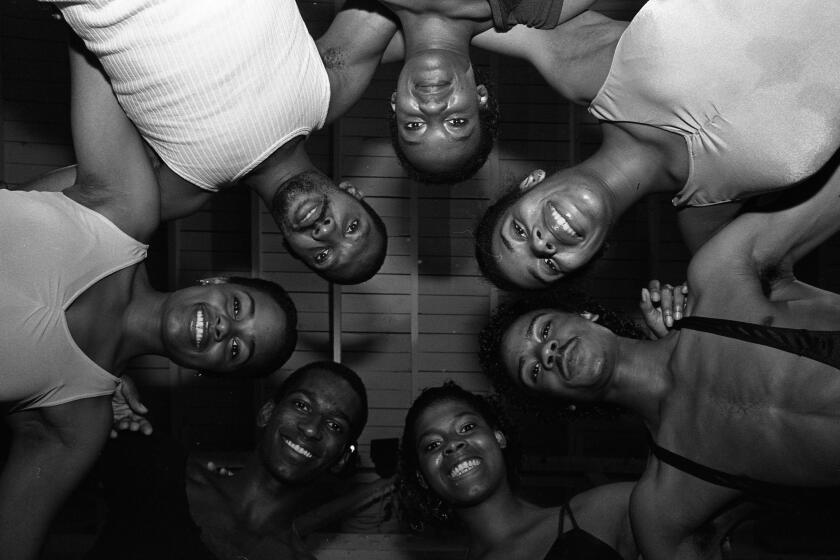Voices of Black Los Angeles: She’s back at work, ‘Pleased to make the choice’
- Share via
This story originally ran in 1982 as part of the “Black L.A.: Looking at diversity” series. We have preserved the original text in order to provide an accurate account of the work in print.
Marilyn Morton, 36, a West Hollywood political consultant, is the image of a successful professional woman. Well-tailored suits, briefcase and business cards accentuate her position, while closely cropped curly hair and a few freckles give her a youthful appearance.
That she is black and has achieved such status amazes some people she meets—even in 1982. She recalls, with irritation, a speech she gave in Orange County. Whites in the audience approached her afterward “with sheer amazement in their faces... They said, ‘We’re just so thrilled to have you here and see you handle this situation so beautifully,’ which says to me. ‘It’s amazing you as a black can come into a group of basically white folks and just really impress everybody.’ ”
In the summer of 1982, The Times published a series on Southern California’s Black community called “Black L.A.: Looking at Diversity.”
‘Very middle-class’ background
Her background, she said, is “very middle-class, cotillion and all, Lord help me.”
Brooklyn-bred, the oldest daughter of a real estate broker and a veterans representative, Morton attended Howard University in Washington, D.C., and taught English before she married her husband Louis, a radio newsman. With her children Louis, 11 (nicknamed Scrappy), Khaim, 9, and Micah, 7, they live on a tree-lined street in the Wilshire District.
After seven years of child-rearing, Morton returned to work.
“I was the oldest girl of five children, and our goals were toward achievement,” she said. “We didn’t grow up thinking that we could not do what we wanted to do. It was expected we’d go to college.
“It was a rather strict upbringing. I was expected to clean and iron the clothes. I’ll never forget I was on my way out to a date, and my older brother didn’t have a shirt. I had to come back and iron him a shirt so he could go out. That’s when I became aware of the dual standard.
“But Louis, my husband, is my friend. He has been the strong point in my life. He’s always encouraged me to do what I want to do. I like him because he has a sense of humor. He tells wonderful stories with embellishments, and we can look at each other and finish each other’s sentence.
I had to come back and iron (my brother) a shirt so he could go out... I became aware of the dual standard.
— Marilyn Morton
“He’s been a person I could turn to with any problem I had. I was home for seven years with the children. I was trying to figure out what to do with myself. When I went back to work, it irritated me when I’d say I’d been a housewife and they said ‘Oh,’ as if that had no significance. Yet I was a more logical, better person that I had been before.
“We belong to parent groups and school advisory committees. As black parents, this is important to us since our kids are in primarily white schools. When Hanukkah and Christmas roll around, Louis and go in and introduce Kwanzaa, the black holiday celebration. That makes us advocates, working toward getting more black teachers and more male teachers.
“The kids are getting more independent. Khaim, that name means life and he’s just full of energy. Micah is a prophet. One day she asked me something, I answered her, and she replied, ‘Mom, that tells me how, but that doesn’t tell me why,’ I sat up and took notice. Scrappy is very thoughtful and introspective, more considerate, probably because he’s the oldest. But no matter what difference inside, the kids form a united front outside.
‘Over the hurdle’
“And me, I’m over the hurdle of the indecisive 20s. I’m basically a practical person. The control I have in evidence now is based on organization, because of my own conflicts I’ve worked out over the years.
“Although it wasn’t much of a choice with three pairs of shoes for the kids costing $100, I think my family would have preferred I stay home all the time. I was really pleased to be able to make the choice. It’s not just about ironing shirts for your brother anymore.”
More to Read
The complete guide to home viewing
Get Screen Gab for everything about the TV shows and streaming movies everyone’s talking about.
You may occasionally receive promotional content from the Los Angeles Times.







